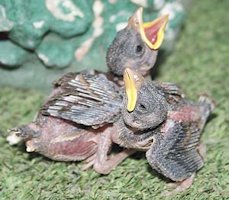
|
Some Common Myths Thought to be True - Myth 42
Myth 42: It's Harmful to Return Baby Birds to their Nest
It is not harmful to baby birds to pick them up and return them to their nests,
despite the common belief that doing so will cause the mother to reject them.
Some birds have limited sense of smell, and many species primarily rely on
visual cues. It is however still best to leave a baby bird alone, as the
parents will usually be close by.
|
| Baby Birds | |
|
Finding a young bird triggers compassion and helpfulness in most birders, but
the very best help you can give a baby bird is to simply leave it alone, or if
absolutely necessary, to intervene in only minor ways. Infant mortality is high
for young birds, and the strongest, healthiest chicks will survive even without
human assistance, no matter how cute and helpless they may seem.
|
|
| ⇦ Back to Myth 41 Return to Myth Choices Page 3 On to Myth 43 ⇨ | |